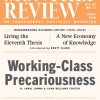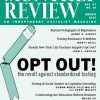Obamacare
As the Affordable Care Act (ACA, otherwise known as Obamacare) continues along a very bumpy road, it is worth asking where it came from and what comes next. Officially, Obamacare represents the latest in more than a century of efforts in the United States to achieve universal access to health care. In reality, Obamacare has strengthened the for-profit insurance industry by transferring public, tax-generated revenues to the private sector. It has done and will do little to improve the problem of uninsurance in the United States; in fact, it has already begun to worsen the problem of underinsurance. Obamacare is also financially unsustainable because it has no effective way to control costs. Meanwhile, despite benefits for some of the richest corporations and executives, and adverse or mixed effects for the non-rich, a remarkable manipulation of political symbolism has conveyed the notion that Obamacare is a creation of the left, warranting strenuous opposition from the right. | more…
Nature
“Nature,” wrote Raymond Williams in Keywords, “is perhaps the most complex word in the language.” It is derived from the Latin natura, as exemplified by Lucretius’s great didactic poem De rerum natura (On the Nature of Things) from the first century BCE. The word “nature” has three primary, interrelated meanings: (1) the intrinsic properties or essence of things or processes; (2) an inherent force that directs or determines the world; and (3) the material world or universe, the object of our sense perceptions—both in its entirety and variously understood as including or excluding God, spirit, mind, human beings, society, history, culture, etc. | more…
Orthodox Economics and the Science of Climate Change
We have finally reached the point where most people around the world believe that climate change is really happening. Almost a decade ago, the landmark report by Nicholas Stern sparked a fierce debate among economists, not over whether climate change was real, but over the costs of addressing it. In the years since, the Intergovernmental Panel on Climate Change (IPCC) has published further alarming reports on projected future global temperatures, rates of glacial melting, and sea levels. Most recently, last December saw an unprecedented agreement by nearly 200 countries at the Paris climate summit to take steps to address the problem.… My concern here is therefore not to continue making the case for the reality of climate change, but instead to show how that reality is portrayed—and distorted—in the mainstream media, with behind-the-scenes assistance from orthodox economic analysis. | more…
Voices, Not Numbers
U.S. educational policy and practice adhere to the old proverb that “children should be seen and not heard.”… Arguments for children—often made by children themselves—having voice and taking action on matters that affect their lives are rarely taken seriously.… Nevertheless, protecting children’s welfare need not exclude inviting them to speak on education issues. In some countries, such as Australia, New Zealand, Portugal, and the United Kingdom, children’s voices and opinions are considered vital…. In the United States, children’s voices are not sought out. They are most often the “objects of inquiry,”… [seen]…”as either a window onto universal psychological laws or as indicators of treatment effects. In both cases, the children themselves are simply instruments…vehicles for measuring outcomes.”… Black and brown children in particular are made into “objects of inquiry,” and are accordingly more watched, restricted, and disciplined.… Further, black and brown children, especially in poor and urban communities, have had their humanity devalued against that of children in whiter, wealthier schools. | more…
The 3,000 Who Stayed
Stories of Cuban medical accomplishments often note that half of the country’s 6,000 doctors had left by 1963. But just as professionals were forsaking their homeland en masse for the comforts of Miami, 3,000 doctors chose to stay. Why did they remain? More important, the number of patients per doctor now doubled, how did they face the daunting task of transforming medicine? In addition to treating patients, their goals included expanding medical care to rural regions; increasing medical education to replace doctors who had left; making care preventive, community-oriented, and focused on tropical diseases; and redesigning a fractured and non-cohesive health system.… The consciousness of the 3,000 who stayed became the “material force” in the production of Cuban health care, as much a material force as the manufacture of pharmaceuticals or the construction of hospitals. | more…
Organizing for Better Lives
The new Workers’ Guide to Health and Safety—with drawings on every page—is a fun read, which is an unusual thing to say about a book with such a serious intent. Garrett Brown, an industrial hygienist with decades of experience as an inspector and activist in California, Mexico, and Bangladesh, claimed with some justification that of all the books on occupational health and safety, “almost none…are accessible to workers or their organizations.” The Workers’ Guide is the first major book aimed at organizing for healthier conditions in the labor-intensive export industries of countries like Bangladesh and China, Mexico’s maquiladora frontier, in Central America and Southeast Asia, and even in the United States itself, where for many, working and living conditions are being beaten down. | more…

April 2016 (Volume 67, Number 11)
The March/April 2016 issue of Foreign Affairs, published by the Council on Foreign Relations, is devoted in large part to the topic of economic stagnation.… [Of the] eight articles on stagnation, only one…—”The Age of Secular Stagnation” by Lawrence H. Summers—is, in our opinion, of any real importance.… Summers heavily criticizes those like Robert J. Gordon, in The Rise and Fall of American Growth (2016), who attribute stagnation to supply-side “headwinds”…blocking productivity growth.… Likewise Summers dispatches those like Kenneth Rogoff who see stagnation as merely the product of a debt supercycle associated with periodic financial crises.… Despite such sharp criticisms of other mainstream interpretations of stagnation, Summers’s own analysis can be faulted for being superficial and vague, lacking historical concreteness.… In fact, the current mainstream debate on secular stagnation is so superficial and circumspect that one cannot help but wonder whether the main protagonists—figures like Summers, Gordon, Paul Krugman, and Tyler Cowen—are not deliberately tiptoeing around the matter, worried that if they get too close or make too much noise they might awaken some sleeping giant (the working class?) as in the days of the Great Depression and the New Deal. | more…
Marx’s Theory of Working-Class Precariousness
As a concept, worker precariousness is far from new. It has a long history in socialist thought, where it was associated from the start with the concept of the reserve army of labor. Frederick Engels introduced the idea of precariousness in his treatment of the industrial reserve army in The Condition of the Working Class in England. Marx and Engels employed it in this same context in The Communist Manifesto, and it later became a key element in Marx’s analysis of the industrial reserve army in volume I of Capital.… In recent years, however, the notion of precariousness as a general condition of working-class life has been rediscovered. Yet the idea is commonly treated in the eclectic, reductionist, ahistorical fashion characteristic of today’s social sciences and humanities, disconnected from the larger theory of accumulation derived from Marx and the socialist tradition. The result is a set of scattered observations about what are seen as largely haphazard developments.… In the face of such a confusion of views—most of them merely ad hoc responses to what is presumed to be an isolated social problem—it is necessary to turn back to the classical Marxian tradition, where the issue of precariousness was first raised. | more…
The Broken BBC
In the face of austerity cuts to state infrastructure provision, the British Broadcasting Corporation has recently generated something of a moral panic about the future of public sector broadcasting—mobilizing both its own news channel and its friends in the corporate media around the issue. Yet in the midst of this ongoing existential crisis, few have asked: What is it we are being asked to defend?… As in car manufacturing, what is provided is a limitedly resourced primary product, altered for different consumption demands, by add-on and take-off parts. | more…
A New Economy of Knowledge
—Brett Clark
Living the Eleventh Thesis
When I was a boy I always assumed that I would grow up to be both a scientist and a Red. Rather than face a problem of combining activism and scholarship, I would have had a very difficult time trying to separate them.… Before I could read, my grandfather read to me from Bad Bishop Brown’s Science and History for Girls and Boys. My grandfather believed that at a minimum every socialist worker should be familiar with cosmology, evolution, and history. I never separated history, in which we are active participants, from science, the finding out how things are. My family had broken with organized religion five generations back, but my father sat me down for Bible study every Friday evening because it was an important part of the surrounding culture and important to many people, a fascinating account of how ideas develop in changing conditions, and because every atheist should know it as well as believers do.… On my first day of primary school, my grandmother urged me to learn everything they could teach me—but not to believe it all. She was all too aware of the “racial science” of 1930s Germany and the justifications for eugenics and male supremacy that were popular in our own country. Her attitude came from her knowledge of the uses of science for power and profit and from a worker’s generic distrust of the rulers. Her advice formed my stance in academic life: consciously in, but not of, the university. | more…
“Realists of a Larger Reality”
—Ursula K. Le Guin
Le Guin is undoubtedly right about resistance in the “real” world, but in reading, only some books offer a call to resistance and the possibilities of a new reality. Among the books considered here, some come to us as “literary fiction”; others are marked as belonging to another, historically denigrated, form, “science fiction” or “fantasy.” This could be a distinction without a difference: two are near-future dystopian novels about corporate capitalism in the United States (both by well-established white authors); two are collections of near-future short stories that set out to critique the human powers that structure our world (written by both established and new voices, primarily writers of color). But the books that embrace rather than evade their status as science fiction or fantasy are the ones able to imagine the resistance and change that Le Guin invokes. | more…

March 2016 (Volume 67, Number 10)
Ellen Meiksins Wood, who died on January 14, was coeditor of Monthly Review with Harry Magdoff and Paul M. Sweezy from 1997 to 2000, and a major contributor to historical materialist thought in the late twentieth and early twenty-first century. Her parents were socialist refugees, members of the Jewish Labor Bund who came to the United States in 1941, after fleeing Latvia in the 1930s, when indigenous fascists came to power. Her mother worked for the Jewish Labor Committee in New York and her father for the United Nations. Ellen obtained her B.A. in Slavic languages at the University of California at Berkeley and went on to do graduate studies in political science at Berkeley, where she met and married Neal Wood, a professor in the department. From the late 1960s to the late 1990s, she taught political theory in the political science department at York University in Toronto. | more…